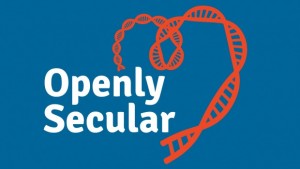Are You Openly Secular? Coalition Launches Campaign to Encourage Seculars to ‘Come Out’

For anyone who has ever needed to “come out” as a humanist, atheist or agnostic, the process can be daunting. The fear of being ostracized, rejected or shamed by friends and family who are firm believers is very real; the loss of community offered by a church or other religious organization can also leave nontheists feeling lonely and isolated. Even though local chapters of the American Humanist Association and other humanist organizations are growing, finding them can be difficult, as they certainly aren’t as easy to spot as the nearest church steeple.
These were all thoughts that I had during the launch of Openly Secular last weekend at the Religion Newswriters Association conference in Decatur, Georgia. Todd Stiefel, whose Stiefel Freethought Foundation is a member of the coalition spearheading the campaign, introduced Openly Secular to a room full of reporters with a video of individuals, both famous and pedestrian, proudly announcing that they were all “openly secular.” I wished that something like this had been around six years ago when I finally marshalled the courage to tell my family that I would no longer be attending weekly church services with them because I no longer believed in God.
While my family took the news better than I expected, not everyone’s friends and relatives are so kind. Todd, and other representatives from the coalition groups, explained the discrimination that humanists, atheists and others who identify as secular in some way, face regularly. This marginalization can be as simple as a dirty look, or as serious as a death threat. And it’s not a problem that just exists in the heads of humanists and other nontheists. As Robyn Blumner, executive director of the Richard Dawkins Foundation for Reason and Science, another coalition partner, explained, there’s data that demonstrates that far too many people in the U.S. are prejudiced against those who do not believe in a god. According to a recent Pew study, 45 percent of Americans believe that faith in a deity is necessary for someone to be moral, imply that atheists and humanists are less moral than theists. Atheists are also left out of the political process, Lyz Liddell of Secular Student Alliance, mentioned, as evidenced by studies done by Pew: Americans would rather vote for a presidential candidate who had smoked marijuana or committed adultery than elect an atheist.
Fortunately, the Openly Secular campaign is not only encouraging atheists, humanists, agnostics and even “nones” to be honest about their lack of belief but also providing resources to counteract this discrimination. The Secular Coalition for America, another group involved in the Openly Secular campaign, provided brochures and fact sheets to reporters at the conference to educate them about the myths and facts surrounding nontheism. These also included resources that kids could use to talk to their families about “coming out” as secular, as well as buttons and pins that individuals could wear to announce their lack of belief.
The core of the campaign, however, focuses on personal videos of individuals identifying as openly secular and encouraging others to do so as well. Modeled after the hugely successful It Gets Better Campaign from Dan Savage, which inspired LGBTQ teens who had been victims of bullying, Openly Secular’s video component puts faces to the statistics and shows that atheists are everyday people. Hopefully, as the campaign continues, more people will “come out” as openly secular, which will reduce the stigma that currently surrounds those with no religion. By being open about our lack of belief and the discrimination that we face, we can show others that the prejudice against atheists and humanists is unfounded and that it is possible to be good without a god.
